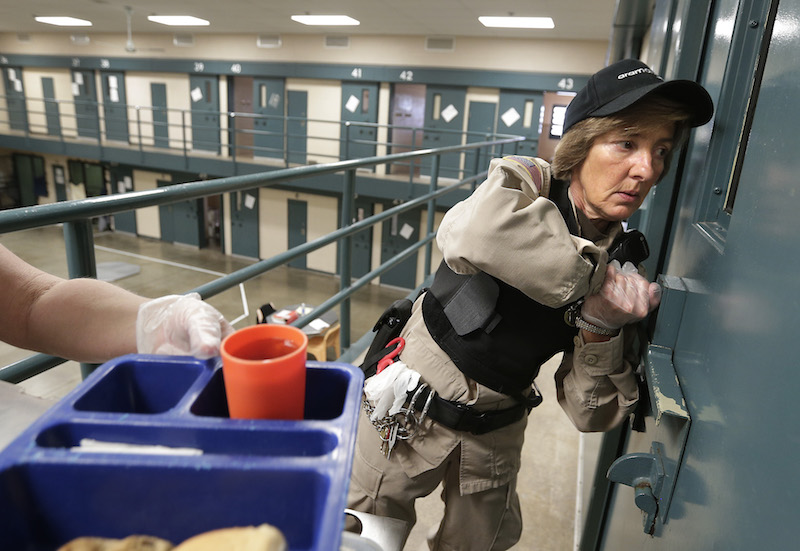News Outlets Reveal Their Utter Contempt for the Incarcerated
Recent articles obscure prison’s dismal conditions with stories about holiday meals. A corrections officer unlocks an access slot as she delivers meals to inmates in a segregation unit at the Ellsworth Correctional Facility in Ellsworth, Kan. (Charlie Riedel/AP Photo)
A corrections officer unlocks an access slot as she delivers meals to inmates in a segregation unit at the Ellsworth Correctional Facility in Ellsworth, Kan. (Charlie Riedel/AP Photo)
News outlets including NBC News, The Washington Post and USA Today drew criticism for stories that echoed frustrated workers and shamed the incarcerated for being served holiday meals. The articles quoted prison guards who were “bitter” that, as the government shutdown left them working without pay, incarcerated people were allowed to eat a decent meal or celebrate a holiday.
Several lawsuits claim prisoners are underfed and even starved, while prison food itself is of notoriously poor quality.
For Christmas, New Year’s and other holidays, inmates are served a slightly nicer meal like steak or Cornish hen, the Bureau of Prisons said in a statement. The meals highlighted in the media coverage were “planned weeks… in advance of the government shutdown,” it added.
Prison guards are among 420,000 essential federal employees working without knowing when their next paycheck will come and unsure of how to put food on the table. The articles never explain what almost seems too obvious, though: incarcerated people have no say in a government shutdown or when it ends.
5 reporters, three stories full of bald racial innuendo, each one with a full interview from the same prison guard union leader at Coleman Penitentiary pic.twitter.com/FuZU8KrqaO
— Dad (@fivefifths) January 7, 2019
Is NBC News proposing that federal prisoners be starved during the shutdown? Or should their pre-ordered holiday food supplies just be discarded and new, less-palatable sounding meals purchased? https://t.co/Rp015siAuE
— southpaw (@nycsouthpaw) January 7, 2019
That’s an incredibly misleading photo. There’s no food in prison that looks like that. In my experience, just bc they call something “steak” doesn’t mean you’d even want to feed it to your dog. https://t.co/KHLM7Gn1dE
— Keri Blakinger (@keribla) January 7, 2019
USA Today and The Washington Post quoted emails that prisoners wrote to their friends about the meals, raising concern about the journalistic ethics of reporting those monitored emails. They were provided by Joe Rojas, who is a guard at Florida’s Coleman Federal Correctional Complex and the head of the prison union. Last April, inmates there also were banned from receiving written letters or greeting cards as part of a national policy.
In 2017, the Bureau of Prisons reached a settlement over sexual discrimination at Coleman after current and former female guards and nurses said they had experienced years of abuse by male colleagues and inmates. The Metropolitan Detention Center in Brooklyn, where NBC News said that inmates were served Cornish hen on Jan. 1, also has a record of reported abuse. Last August, a female inmate there said she was raped by two guards.
Rojas has previously said Coleman is considered a prison for people who might be targets in a regular prison—“snitches, for high-profile inmates, and for people that drop out of gangs”—suggesting that meals there might not be representative of the whole.
In September, convicted serial molester and former U.S. Olympic gymnastics team doctor Larry Nassar was sent to Coleman. It is also where Boston mobster James “Whitey” Bulger served part of his sentence. The Metropolitan Detention Center is where rapper Tekashi 6ix9ine was transferred after safety concerns at a different prison. It is also where infamous former pharmaceutical executive Martin Shkreli was sent after his bail was revoked for offering money to anyone who grabbed hair from Hillary Clinton’s head during her book tour.
Dig, Root, Grow
This year, we’re all on shaky ground, and the need for independent journalism has never been greater. A new administration is openly attacking free press — and the stakes couldn’t be higher.
Your support is more than a donation. It helps us dig deeper into hidden truths, root out corruption and misinformation, and grow an informed, resilient community.
Independent journalism like Truthdig doesn't just report the news — it helps cultivate a better future.
Your tax-deductible gift powers fearless reporting and uncompromising analysis. Together, we can protect democracy and expose the stories that must be told.
This spring, stand with our journalists.
Dig. Root. Grow. Cultivate a better future.
Donate today.








You need to be a supporter to comment.
There are currently no responses to this article.
Be the first to respond.